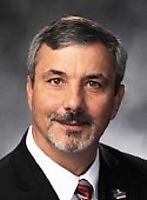JEFFERSON CITY, Mo. — Lobbyists and lawmakers are thanking House Education Chairman Steve Cookson, R-Poplar Bluff, for his leadership during the contentious transfer debate and hoping the rural Republican’s demeanor will help bring uncommon allies to the fight.
“Rep. Steve Cookson so clearly has more public school knowledge and experience than his Republican colleagues in the legislature that it is a real blessing that he is the chairman of the powerful house education committee,” Franc Flotron, lobbyist and retired state senator, said.

Cookson occupies an interesting space in the Capitol. The Republican has largely supported the education reform agenda despite hailing from a rural district, where school administrators and teachers unions typically have a more pronounced influence.
“Wherever a student is born in Missouri, whether it’s the most rural or most urban part, they all have the same right to a quality education,” Cookson said. “I think sometimes the urban districts aren’t aware of or maybe just don’t care about the rural district issues, and that’s something I hope I’m able to change with my position as chair and my background.”
The former superintendent Cookson says rural districts and their members are somewhat wary of the private option currently in the bill before the legislature making transfer fixes. But he says that concern is often assuaged when he explains the details of the option.
“I told my superintendents in my district, this isn’t going to impact you,” Cookson said. “We don’t have any unaccredited districts in my area, and we also don’t have any private schools in this region that aren’t religious. And the bill doesn’t allow you to transfer to a religious school, so it’s not an issue for my districts.”
Education has been a tough issue for Missouri, creating strange bedfellows. Strange allies and even stranger enemies make the issue one of the toughest public policy debates in the state. Cookson and his fellow private option advocates say rural districts are often being directed by statewide organizations driven by leadership in Kansas City and St. Louis regions.
“I think sometimes the establishment is a little hypocritical,” Cookson said. “Rural districts are often used in messaging for the Kansas City and St. Louis areas, but if those rural districts have a problem, it’s not always a priority for the urban folks.”
And there, where rural and urban interests are sometimes contrary, Cookson hopes he can locate some common ground. Everyone closely involved in the transfer issue cares about the students, he says, and that’s where the focus can lie.
“Steve Cookson has shown tremendous leadership this session,” Kate Casas, CEAM State Policy Director, said. “Cookson’s leadership was on display at all levels of the education debate this session, from ushering a complicated transfer bill through committee to creating an open and welcoming process for all members to be engaged in while working on the final product. Steve should be proud of his work this session.”
Cookson said he was becoming more and more optimistic about the odds of placing a bill on Gov. Jay Nixon’s desk dealing with transfers. Many rural members, he says, become more open to the private option after hearing the details.
“If we don’t do something now, it’ll be another year of flying by the seat of our pants,” Cookson said. “We’ll have more districts go bankrupt, and those students will transfer and put a strain on other districts, and it becomes a massive domino affect.”
Collin Reischman was the Managing Editor for The Missouri Times, and a graduate of Webster University with a Bachelor of Arts in Journalism.



